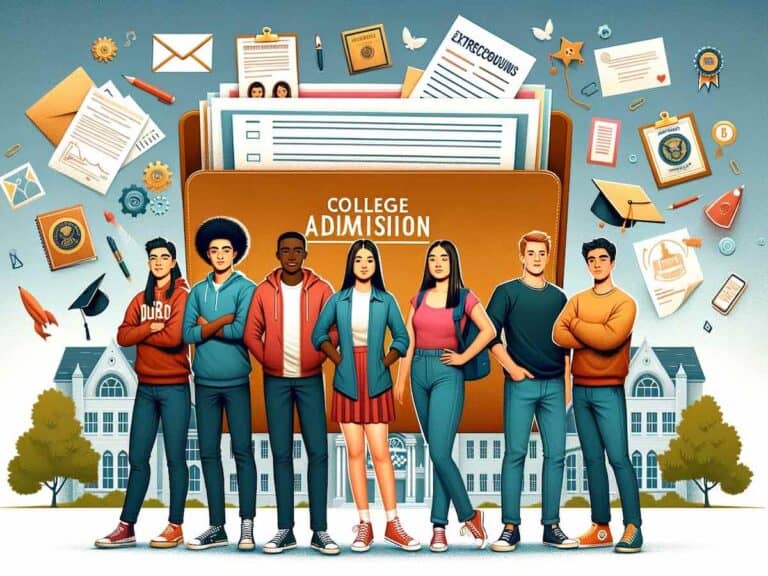Are You a First Gen Student? Simple Test To Know
The simplest definition of a first-generation college student is a degree-seeking student who is first in the family to attend college.
However, one college may have a slightly different definition of what a first-generation student is from the other.
Getting it right is a must, as being a first-generation student may impact your chances of getting into college.
According to the Diverse: Issues In Higher Education publicaition, the majority of college students in the US — 56%, to be exact — are first-generation students.
Wondering whether or not you are considered a first-generation college student and what impact it has on your application to your top-choice institution?
Read on.

Who Qualifies as a First Gen Student
Believe it or not, you may be considered a first-generation student at one college but not at another.
That’s because some postsecondary institutions define a first-generation college student differently, with some agreeing to the definitions of others but with the inclusion of their own unique definitions.
Depending on the school, you qualify as a first-generation college student if your parents or guardians:
- Did not go to college
- Went to college but were unable to complete their undergraduate program
- Have an associate’s degree but not a bachelor’s degree
- Have a degree from outside the US — higher education in some countries may have a different meaning
To have an idea of whether or not you are in fact a first-generation student, visit the website of the college of your choosing.
You may also get in touch with its admissions office to inquire so that you can have a more accurate application.
How do colleges determine If you qualify as 1st gen or not?
College admissions officers ask applicants whether or not they are first-generation students through the application platforms they are using.
The Common App and Coalition App, for instance, ask college-bound teens to indicate if they are first-generation students and the highest educational attainment of their parents or guardians.
As far as the college admissions process and the pursuit of an undergraduate degree are concerned, there are both advantages and disadvantages to being a first-generation college student.
Do you qualify if your siblings went to college or are in college now?
Whether or not you are a first-generation student is determined solely by the educational status or history of your parents or guardians.
Therefore, having a sibling of yours who went to college or is currently in college still makes both you and your brother or sister first-generation students if your parents or guardians did not go to college.
Do you qualify if your other relatives went to college or are in college now?
When it comes to determining if you are a first-generation student, the educational attainment of your parents or guardians is the only thing that matters.
Even if your grandparents, aunts, uncles or cousins have a bachelor’s degree to their name but your parents or guardians don’t, you are still considered a first-generation student.
Pros
An Edge in the Admissions Process
Many colleges and universities welcome students from different backgrounds and with different experiences, including first-generation students, to create a more diverse campus.
Numerous postsecondary institutions, especially selective ones, consider first-generation status in admissions.
The following are some of the top institutions in the US, based on US News’ Best National University rankings, and the importance first-generation status plays in the review process:
| Institution | First-Generation |
| Princeton University | Considered |
| Massachusetts Institute of Technology | Considered |
| Harvard University | Considered |
| Stanford University | Considered |
| Yale University | Considered |
| University of Pennsylvania | Considered |
| California Institute of Technology | Considered |
| Duke University | Considered |
| Brown University | Considered |
| Johns Hopkins University | Considered |
| Northwestern University | Considered |
| Columbia University | Considered |
| Cornell University | Considered |
| University of Chicago | Considered |
| University of California, Berkeley | Considered |
| University of California, Los Angeles | Considered |
Access to Support Programs
Institutions of higher education are well aware of the challenges that first-generation students face in the college application process as well as completing an undergraduate degree program.
Due to this, many of them have established services and programs exclusive to them, such as:
- Admissions process geared toward first-generation students
- On-campus activities that enable first-generation students to meet each other
- Matching them with first-generation alumni members
- Academic support amenities
Scholarship Opportunities
Other than financial aid and scholarships from the government and colleges themselves, whose application process is commonly streamlined for first-generation students, there are also those that are available from third-party providers.
Increased Motivation to Graduate
Being a first-generation student, in most instances, means that the teen’s parents have zero college experience, which can inspire him or her to attain academic success to break the cycle of having no bachelor’s degree holder in the family.
Many first-generation students come from low-income backgrounds.
As such, getting into college serves as an opportunity for a first-generation student to enjoy upward social mobility through having more career options and earning prospects that being a college graduate brings.
Setting a Good Example
According to the initiative of the National Association of Student Personnel Administrators (NASPA), only around 42% of first-generation college students earn a bachelor’s degree.
So, in other words, the majority of first-generation students fail to succeed in their postsecondary education pursuits.
Attending college and graduating, too, allows younger family members and relatives such as your siblings and cousins to realize that earning a bachelor’s degree is doable even if their parents or guardians didn’t go to college.
Cons
Lack of Parental Assistance
To many first-generation students, applying to college can be extremely complicated and stressful, what with all the documents they need to get a hold of and the statements and essays they have to write.
Because their parents have no idea of what it’s like to apply to college, they are unable to lend a hand to their kids.
It’s a good thing that college-bound teens who are first in the family to apply to college can turn to their high school counselors, teachers and even admissions officers at colleges for assistance.
Financial Challenges
As mentioned earlier, it’s not uncommon for many first-generation students to be from low-income families.
While they may easily qualify for need-based scholarships as well as scholarships exclusive to first-generation college students, not all college-related costs are usually covered by financial assistance.
That is why many of them end up taking out more student loans than their peers, which first-generation college students will have to repay whether or not they successfully complete their undergraduate programs.
Impostor Phenomenon
Simply put, the impostor phenomenon is characterized by doubts an individual has about his or her capabilities as well as the fear of being exposed as a fraud or, as the name suggests, an impostor.
According to by Brown University, the impostor phenomenon is more common among underrepresented college students, including first-generation students.
And the less diverse the campus, the more intense one’s impostor phenomenon can become.
Making matters worse for first-generation students is the fact that a lot of them used to work to bring some income to the family but had to quit and leave home to earn a bachelor’s degree.
It goes without saying that the anxiety and isolation that the impostor phenomenon brings can make college harder.
Does Your Status Look Good or Bad on a College Application?
Being a first-generation student will not make your college application weaker and thus lower your chances of getting admitted. On the contrary, it may give you a slight edge in the admissions process if the college considers first-generation status.
However, do take note that being a first-generation student alone will not be enough to get you in — you will still need to make the various components of your application strong to get an offer to enroll.
It may, however, be a concern in some cases.
For instance, since it’s mentioned earlier that most first-generation students are from low-income backgrounds, college admissions officers at need-aware colleges, where the applicant’s ability to pay full tuition is taken into account, may have second thoughts when evaluating your application.
Disclaimer: The views and opinions expressed in this article are those of the authors and do not necessarily represent those of the College Reality Check.
![Do Colleges Look at High School Attendance?[Application Tips]](https://collegerealitycheck.com/wp-content/uploads/124540883_l-1024x683-1-768x512.jpeg)




